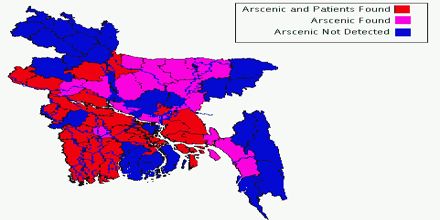Arsenic problem in Bangladesh
Water is an important element in environment. Man cannot live without it. At present arsenic contamination in drinking water is one of the severe problems of Bangladesh. Arsenic is a very poisonous white compound of frail element. This element is found out largely in the tubewell water of 59 districts of our country. This polluted water causes many serious diseases in human body such as arsenicosis, sores, stomach troubles and gangrene etc. Arsenic is most poisonous. About 24 millions people of Bangladesh are endangered for it. People should be conscious of it. We can get rid of it through drinking arsenic-free water. In this regard, deep tubewells should be set up with a large extent. Immediate steps must be taken by the government in order to check this pollution such as- research and analysis of source of water. Investigation of possibility of alternate source of safe water, marking of dangerous tubewell, arrangements of proper treatment of arsenic patients etc.

Arsenicosis is a disease caused by drinking tube-well water containing arsenic. People who drink uncontaminated water do not catch arsenicosis. Arsenic is highly toxic in its inorganic form. Contaminated water used for drinking, food preparation and irrigation of food crops poses the greatest threat to public health from arsenic. Long-term exposure to arsenic from drinking-water and food can cause cancer and skin lesions. The number of arsenicosis patients in Bangladesh is relatively low because the people of our country eat a healthy, balanced diet containing fish and vegetables. The deep tube-wells need to be tested to separate the safe from the unsafe ones. The surface water in ponds and rivers is a potential source of arsenic-free water. Seminars and creation of public awareness on arsenicosis can help us greatly to prevent this disease.
















